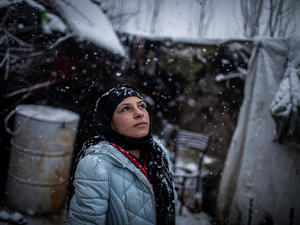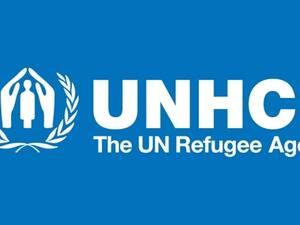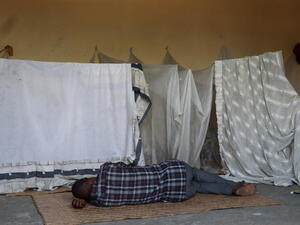More support needed as Mosul displacement grows
More support needed as Mosul displacement grows

After fleeing his home earlier in the day, an Iraqi hauls a wooden cart loaded with his family's belongings to an Iraqi Special Forces outpost in eastern Mosul.
HASANSHAM, Iraq – When displaced Mosul resident Fawzi Mohammed and his family finally reached safety at this camp in northern Iraq, he broke down and wept.
Given a tent, a hot meal and a chance to clean up after a harrowing flight from Iraq’s embattled second city, his sense of security is returning for the first time in years.
“We feel stable now,” he said. “My neighbour Abo Mostafa got his own tent too. So, we are a settled family now, and I've just had my shower.''
Just over a month since the start of the Mosul offensive, UNHCR, the UN Refugee Agency, and its partners have been intensifying life-saving, emergency assistance for tens of thousands of displaced Iraqis like Mohammed and his family.
They are among a rapidly-growing number of people fleeing since fighting intensified in the more densely-populated urban areas of Mosul. Of the 60,000 people who have fled their homes since the start of the campaign on October 17, around 40,000 have done so since the start of November.
''It's very important for every family to have their own shelter, because nobody knows how long they will stay in this camp,” Hawre Abdullah, a field officer at Hasansham camp explains. “So, because of that, at UNHCR, we are trying our best to find a shelter per family.''
As winter looms across northern Iraq, UNHCR is stressing the need for sustained funding support and a redoubling of efforts to reach the growing number of people displaced by the fighting in and around Mosul - many of whom now live in rudimentary conditions in camps.
Thanking donors for their support for those fleeing Mosul, UNHCR spokesperson Adrian Edwards on Friday (November 18) highlighted the urgent need for “additional resources to support the tens of thousands living in miserable conditions.”
''It's very important for every family to have their own shelter, because nobody knows how long they will stay.”
Close to half of those fleeing Mosul are children, according to UN data and UNHCR surveys, and more than half are women and girls, including many female-headed households.
UNHCR currently has six camps open, hosting well over 14,000 people and with a capacity for 54,600. Three more are under construction and one is in planning. All told, the 10 camps will have capacity for 17,000 plots.
Speaking at a news briefing in Geneva on Friday (November 18), Edwards said additional land is required for UNHCR’s total planned plots, in order to provide shelter for 120,000 people in camps.
“If needed, UNHCR and its partners, including the Government of Iraq, can potentially host 700,000 people, including a number of shelter solutions outside of camps. But funding for this is crucial,” Edwards told reporters.
With partners, UNHCR is providing life-saving protection and assistance to newly-displaced families, making sure they have adequate shelter, and basic household items including mattresses, stoves, kitchen and hygiene sets and jerry cans. So far, more than 5,705 emergency relief packages have been distributed by UNHCR.
“With temperatures declining, the focus is on protecting people against the weather and keeping them safe.”
“With temperatures declining, the focus is on protecting people against the weather and keeping them safe and warm,” Edwards said. “We plan to reach 1.2 million people in Iraq with special winterized kits including blankets, heating stoves, plastic tarpaulins and water and kerosene jerry cans. UNHCR is also providing cash assistance and plans to winter-proof 53,000 tents.”
UNHCR is also bolstering protection monitoring and psychosocial and legal assistance through mobile teams to ensure timely interventions when problems are identified. Among the main concerns are family reunifications, supporting female-headed households, a lack of documentation and assisting victims of abuse.
As more families, like that of Mohammed, flee Mosul, Edwards again stressed the need for all parties in the conflict to respect the rights and lives of civilians, and emphasized the importance of freedom of movement for residents of Mosul.
“We remain deeply concerned about the plight of civilians and -- at the end of the first month of the campaign -- call for international humanitarian law to be upheld.”









